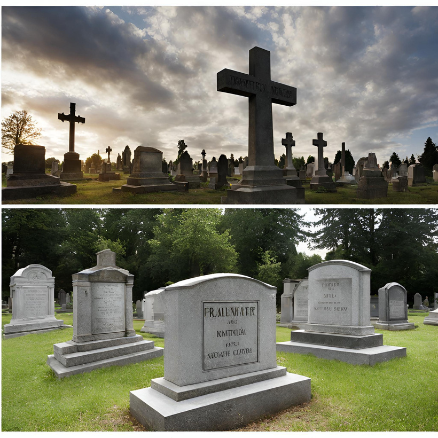Making A Choice Between Public Cemeteries And Private Cemeteries
When it comes to choosing between public cemeteries and private cemeteries, you should ideally select the option that your loved one had wanted. This is easier if the person who passed on left clear instructions about where they wished to be buried or bought a burial plot in advance. However, if they did not leave any such directions, or if you are not sure about what they would have wanted, you need to make a decision based on various factors.
Alternatively, if you are planning to buy a burial plot for yourself and your spouse, you may be in a dilemma about choosing the right kind of cemetery. To make a suitable choice, it is important to first understand what each type of cemetery is and what their advantages are. This will help you make a more informed decision about where to buy a burial plot or where to bury your loved one.
So, let us take a closer look at what public cemeteries and private cemeteries are and when you should choose either of these options.
What Are Public Cemeteries?
A public cemetery, as the name indicates, is a plot of land that is available for use by the general public. These cemeteries are typically open to everyone, and anyone can buy a burial plot in such cemeteries. There are different kinds of public cemeteries available today, and you can make a choice based on what suits your requirement best.
For instance, there are general public cemeteries that are typically owned by corporate entities. These are for-profit plots of land. Then, there are religious public cemeteries that are owned by religious organizations. This could be your local church, a synagogue or any other religious body. In most cases, such public cemeteries are operated on a not-for-profit basis.
Veterans’ cemeteries are another kind of semi-public cemeteries. Run by government bodies, these cemeteries are not open fully to the public, but rather only to veterans and their families. In addition to the types of public cemeteries discussed above, there are also district or municipal cemeteries that are owned and operated by the local municipal bodies. They may generally be sold out or reserved for burying destitute or homeless people in the county.
Plan Your Farewell with Grace – Our Pre-Planned Caskets Offer Peace of Mind!
What are Private Cemeteries?
Private cemeteries are privately owned plots of land that are reserved for burial. These plots are not typically sold to the general public. Rather, they are reserved for use by the members of the family that owns the cemetery. In some cases, a cemetery that was once privately owned by one family may have been sold or passed on to other individuals. Nevertheless, they will still be considered as private cemeteries as long as the burial plots on the land are not sold to people of the general public.
Recommended Reading: Difference Between Cemetery, Graveyard And Mausoleum
Public Cemeteries Vs. Private Cemeteries And Which One To Choose?
Choosing between public cemeteries and private cemeteries may be easier in some cases than in others. Let’s begin with the easiest scenario, which is when the person who has passed on left some explicit instructions about where they wanted to be buried. For instance, your loved one may have a plot reserved for them in a private, family-owned cemetery. Alternatively, they may have wanted to be buried in a public religious cemetery that is run by their local church or their preferred place of worship. In these circumstances, the choice between public cemeteries and private cemeteries is clear enough for you to make an informed decision.
However, if the person who passed on did not leave any detailed instructions for you to follow, you can start by asking around if they had any burial plot reserved for them in a private cemetery. In case they did, you can ensure that they are laid to rest in that spot. On the other hand, if they had already purchased a burial plot in a public cemetery, you will have to bury them in that spot.
If they did not purchase a burial plot in either a public or a private cemetery, you will have to make the purchase before arranging the funeral service. You can buy a burial plot in a public cemetery, preferably one that is associated with their religious beliefs or their preferred place of worship. If your loved one was a veteran or a family member of a veteran, they may be eligible for a burial in a veterans’ cemetery too.
Here's a concise table highlighting the key differences between public and private cemeteries:
Aspect |
Public Cemeteries |
Private Cemeteries |
|---|---|---|
| Ownership | Typically owned by government entities, municipalities, or religious organizations. | Owned by private individuals or families. |
| Access | Open to the general public; anyone can purchase a burial plot, subject to availability. | Restricted to specific individuals, often family members or members of a particular organization. |
| Cost | Generally more affordable; however, prices can vary based on location and amenities. | Often more expensive due to exclusivity and maintenance of the grounds.
|
| Maintenance | Maintained by the owning entity, such as the government or religious organization; maintenance standards can vary. | Maintenance is typically managed by the owning family or a designated private entity, often resulting in well-kept grounds. |
| Regulations | Subject to public regulations and policies; may have specific rules regarding monuments, decorations, and visiting hours.
|
Governed by private rules set by the owners; may offer more flexibility in terms of customization and visitation. |
| Religious Affiliation | May be affiliated with a particular religion (e.g., church cemeteries) but generally accommodate various religious practices. | Often associated with a specific family or religious group, with burials reflecting particular religious or cultural traditions. |
| Availability | Can become crowded, especially in urban areas; availability of plots may be limited. | Limited to those granted permission by the owners; availability is controlled by the private entity or family. |
| Perpetual Care | Some offer perpetual care funded by endowments; however, the level of care can vary.
|
Perpetual care is typically arranged and funded privately by the family, ensuring consistent maintenance. |
Make An Informed Decision About Your Choice Of Cemetery
By considering the aspects explained above, you can make an informed choice between public cemeteries and private cemeteries. In case you are looking for a burial plot for yourself, keep your budget in mind and choose a public cemetery accordingly if you do not have a plot reserved in a private cemetery.
When it comes to selecting a final resting place for yourself or a loved one, understanding the distinctions between public cemeteries and private cemeteries is crucial. These two options offer different advantages and considerations, ensuring that you can make an informed choice based on your preferences and needs.

![Upgrade to Premium Weight [18-gauge steel]](http://titancasket.com/cdn/shop/products/casketthicknesswithnumbers.png?v=1680642906&width=533)









